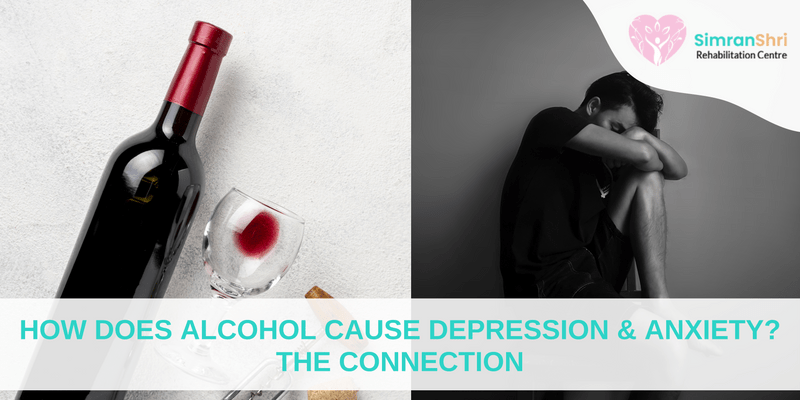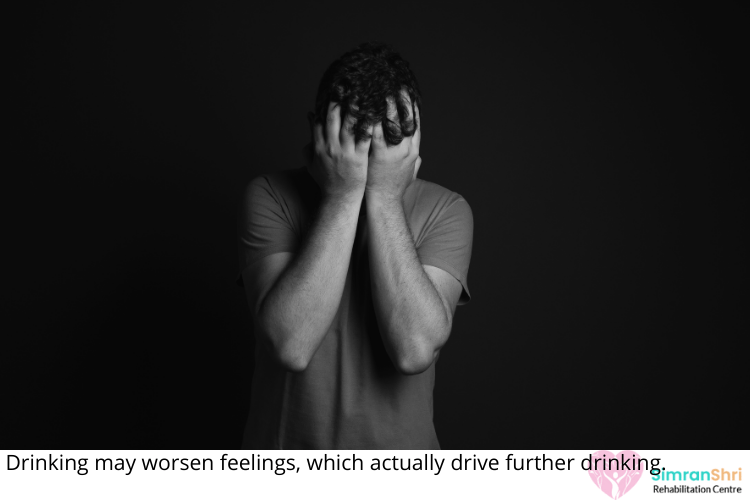

The brain function is dependent on the balance of chemicals and processes. Alcohol is a depressant; it can disturb this balance thus, affecting one's feelings, thoughts, actions and mental health. This is also due to neurotransmitters responsible for transmitting signals from one nerve to the other. For example, the relaxation one feels on consuming alcohol is due to the changes in the brain due to alcohol. It can make individuals feel confident by suppressing the part of the brain associated with inhibition.
As the individual continues to drink, the impact on the brain function keeps increasing. The likeliness of the individual experiencing negative emotions is high, which in the long-run impacts mental health.
This blog briefly explains the link between alcohol. Depression, anxiety, and the best treatment approach for the coexisting conditions.

Alcohol and depression have a cause and effect relationship. However, it is difficult to determine which led to the other; there is no clarity whether regular drinking resulted in alcohol addiction or an individual consumed alcohol to self-medicate the depression symptoms- Studies show that both are closely associated. Alcohol affects the nerve-chemical system responsible for regulating one's mood, and reducing alcohol consumption can alleviate the mood.
Antidepressants and alcohol should never be mixed; some widely prescribed antidepressants can increase the probability of relapse to alcohol addiction. So one should never consume antidepressants without consulting a mental health professional. The Best Alcohol Rehabilitation Centre offers dual diagnosis treatment to simultaneously treat both Depression and alcohol withdrawal symptoms to avoid any disruption.
For an anxious individual, consuming the counter antidepressant and alcohol may look like a solution. The so-called "relief" one feels is due to the alcohol-caused chemical changes in the brain. These changes are short-lived; masking anxiety with alcohol over time results in reliance on alcohol to feel better and build an alcohol tolerance. As time passes, the individual would need a higher dose to feel relaxed. This is when the pattern turns into alcohol dependence. The aftereffect of alcohol or hangover can make an individual anxious, too, for it might not be noticeable, but it worsens the symptoms for individuals with an ongoing anxiety issue. The Best Alcohol Rehabilitation Centre online helps individuals deal with anxiety and other environmental stressors with healthy coping styles.
● Sadness
● feeling worthless
● fatigue
● guilt
● lack of energy or lethargy
● loss of interest in activities that once felt fun
● difficulty concentrating
● substance use
● suicidal thoughts
● Excessive drinking in any one episode
● Regular consumption of alcohol
● Uncontrollable craving for alcohol
● sneaking alcohol to places, it is not allowed
● continuing to drink despite negative consequences on physical health and personal relationships
● avoiding activities and social obligations due to alcohol
● continued drinking despite symptoms of depression or a mood disorder
The alcohol abuse treatment centre treats both conditions simultaneously. The most effective alcohol and depression treatments include:
Alcohol consumption worsens depression, as it directly impacts the brain's neurotransmitters. Antidepressants and alcohol craving reduction medicines are used to even the chemical in the brain to relieve depressive symptoms and diminish the desire to drink. Rehabilitation
Quitting alcohol can cause severe and even life-threatening withdrawal symptoms. Doctors often recommend individuals to consider inpatient treatment centres. These centres medically supervise the withdrawal symptoms. And help individuals learn healthy coping styles to deal with depression without taking on alcohol.
Cognitive behavioural therapy can help you modify the negative ideation and maladaptive behavioural patterns that result in depression and alcohol addiction.